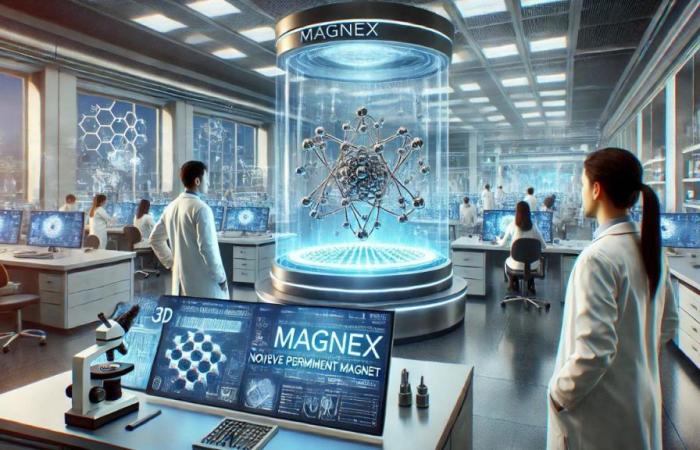Materials Nexus, a leading company in the field of clean technologies, has just reached a major milestone with the design of MagNex, a new permanent magnet free of rare earths. This breakthrough, resulting from a synergy between artificial intelligence (AI) and materials science, positions the company as a leader in the design of innovative solutions for the industries of tomorrow.
The traditionally slow and expensive process of discovering new materials has been revolutionized by the adoption of AI. The Materials Nexus platform made it possible to identify and analyze more than 100 million compositions of potential permanent magnets, thus eliminating trial and error approaches.
Collaboration and rapid development
In collaboration with the Henry Royce Institute and the University of Sheffield, Materials Nexus not only identified MagNex but also completed its synthesis and testing in record time. Where the development of standard magnets required decades, MagNex was designed, synthesized and tested in just three months.
This rapid development features an 80% reduced material cost and a 70% reduction in carbon emissions per kilogram of material, compared to rare earth magnets currently on the market.
Impact on growth industries
Permanent magnets play a crucial role in many growing industries, such as electric vehicles (EVs), wind turbines, robotics and drones. With demand expected to increase significantly, MagNex is positioning itself as a sustainable alternative to the supply challenges of rare earths, of which metals such as neodymium and dysprosium are particularly vulnerable.
Towards an accelerated ecological transition
Materials Nexus’ systematic approach can also be applied to other key areas of the ecological transition, such as semiconductors, superconductors and catalysts. This makes material design intentional, less expensive, faster and more environmentally friendly.
Dr. Jonathan Bean, CEO of Materials Nexus, expressed his satisfaction: “I am delighted to announce MagNex, a significant milestone in the use of AI to design future materials that are less expensive, more efficient and more efficient. sustainable than existing options.”
Perspectives et collaborations futures
This discovery also marks the start of a fruitful collaboration with the University of Sheffield. Prof. Iain Todd, specialist in metallurgy and materials processing, highlights the importance of this innovation: “The combination of the Materials Nexus approach and the cutting-edge facilities at the Henry Royce Institute in Sheffield has enabled the development of a material innovative magnet with impressive speed.”
Bruce Adderley, Director for Make & Use – Net-Zero at Innovate UK, also recognizes the potential impact of this innovation: “This groundbreaking discovery, made possible thanks to funding from Innovate UK, could have a significant impact on our net-zero ambitions. carbon, particularly in renewable energy and low-carbon transport.”
The creation of MagNex by Materials Nexus perfectly illustrates how artificial intelligence is transforming materials science. By eliminating the need for rare earths in the manufacturing of high-performance magnets, this innovation opens up promising prospects for research, industry and the protection of our planet. The future of materialology, driven by AI, is not only promising but also essential to meet the environmental and technological challenges of tomorrow.






